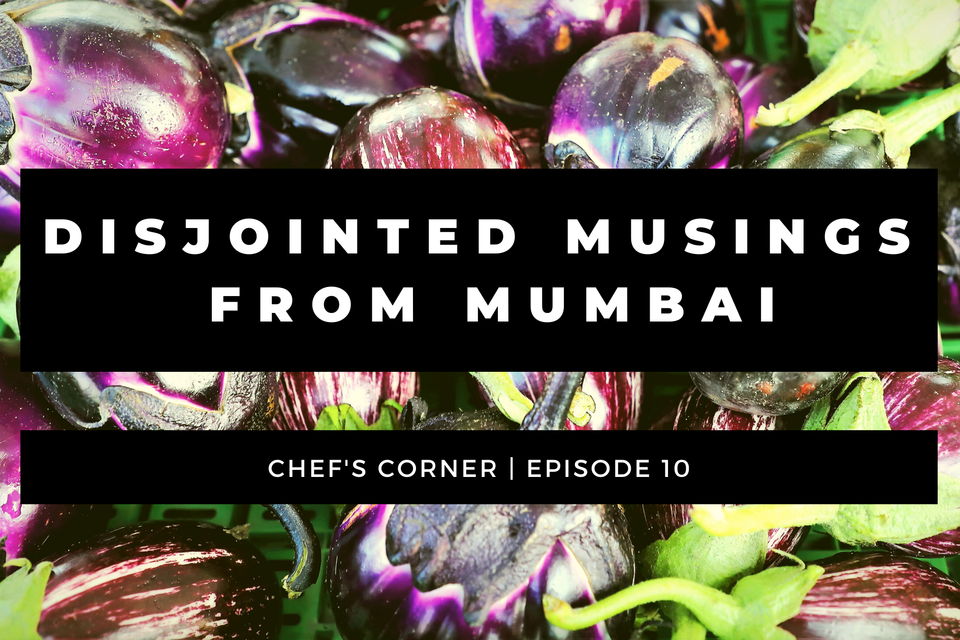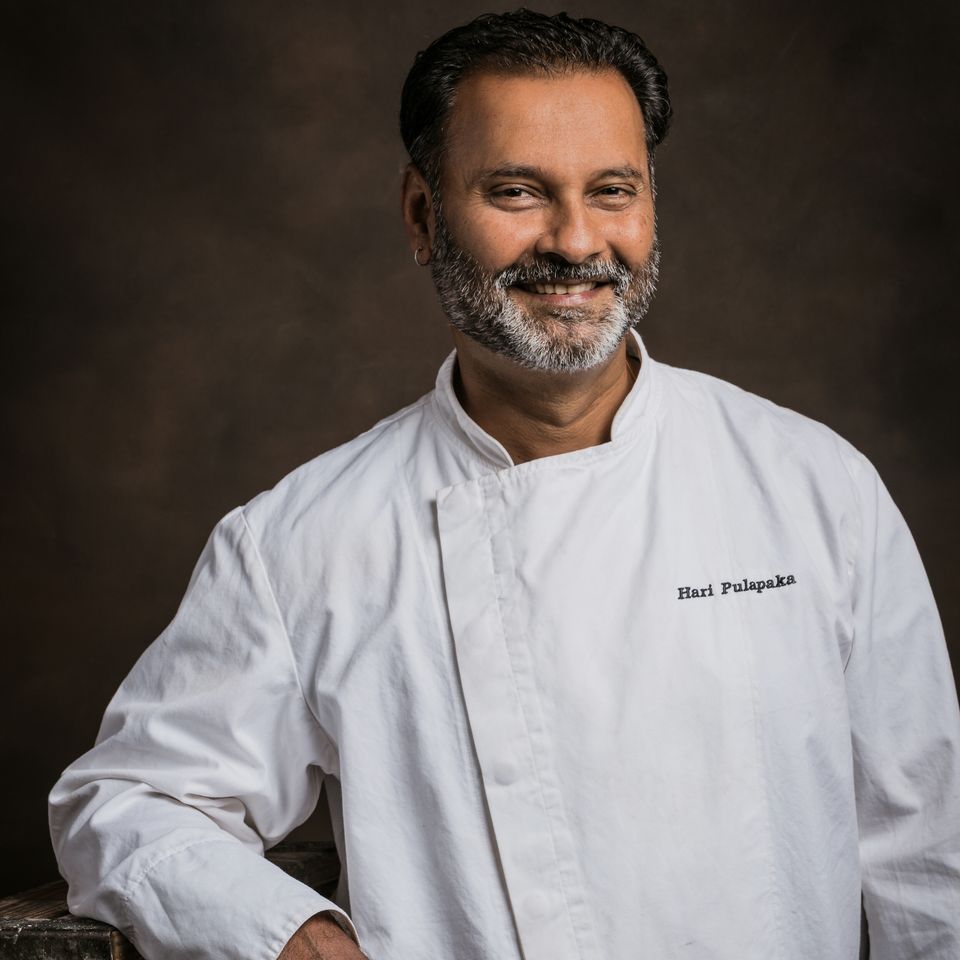Disjointed Musings from Mumbai
By Hari Pulapaka, PhD, WCMC, CEC
January 6, 2021 This week, we heeded my “privileged” advice from last week about traveling prolifically and safely. After following every mandated protocol, we boarded EK220 at MCO bound for DXB. A few hours later, we lounged over on EK500 to BOM. It’s an all too familiar journey for my wife and me, except, this has come after an almost three year gap - for obvious reasons. Being in my city - Mumbai (formerly, Bombay) is good for my soul and for my humanity. The megapolis is kind and aloof while remaining India’s “city of dreams” for millions. In fact, Bollywood has set up camp at the lower levels of the Grand Hyatt and it’s fascinating to watch the seemingly modest means that entertain millions. Although I’m not about to lean into a travel blog, I would be remiss if I didn’t re-emphasize the exuberant benefits of immersive travel. We’re in India for another week playing hide-from-and-don’t-seek Omicron, even as it appears that we left a viral explosion behind in Central Florida.
When you travel to another country with a cuisine that’s decidedly different from your norm, and you're deciding on what to have for breakfast to start your day, do you seek out familiar items or do you venture into local customs? Are you the type that asks the waiter whether they have your favorite brand of ketchup to swipe the morning spuds with or do you go along with the local accompaniment of tomato and ginger chutney with a tadka of curry leaves and mustard seeds? If you chose the former, you might not be immersed. Every morning, we watch the locals request eggs and croissants and the overseas visitors also request… eggs and croissants. Meanwhile, Jenneffer and I (especially, I) gorge on chole, paratha, missal, idli, dosa, poha, upma, and Mangalore filter coffee. I tell my wife that I could eat like this every day of my life because, after all, this is the food that raised me.
Speaking of being sensitive to local sentimentality, the global food supply chains are a complex labyrinth of connections, disconnections, transactions, and processes. While it may not always be necessary to choose between the options, the reality begs the question: "Which is more important: Buying Local or Knowing Where Something Comes From?" Of course, part of the answer depends on what one means by the word "important". And the rest of the answer is that "both are". In the case of food, when an ingredient is locally sourced, part of its draw is the fact that there is a tangible identity to the person or people who grew or raised it, and consequently, we feel better connected to the food. Somehow, it seems to taste better because of that connection. Perhaps, that is so because we feel reassured that the food is safer and representative of our own sense of place (terroir).
Now consider the case where one knows the source of an ingredient and that happens to be halfway across the world. We would think nothing of the geographical origin of some commodities like say, wine, and often we seek the best ones out, irrespective of their physical origin. Alphonso mangoes grown and packed in India, cheeses from Europe, tea and rice from China are just a few of thousands of ingredients which travel great distances to household and restaurant kitchens all over the globe. But we couldn't imagine a world without them. Many items like spices come from faraway lands and while they may be packed in the USA (as they are in the case of certain name brands), the raw materials come from unnamed sources. Yet, they form the pantry staples of even the most ardent locavores. It would be difficult to visit an ethnic market in the United States and find ingredients which are sourced nationally, let alone locally. Does this fact make them less desirable? Or, does it make them less sustainable? The answer is of course, not necessarily, and often, hardly so.
Finally, imagine the hypothetical case of actually knowing a farm and its farmers halfway across the world that practiced responsible farming and grew delicious food. Would we feel more comfortable sourcing and consuming that? I suspect the answer is yes, despite the expense of the cost of transporting the goods across such a large distance. In this case, our personal connection with the source gives us a sense of comfort and even pride.
So, the points are these. Local is good and often the best option because we feel most connected. Much of what we utilize is hardly local, yet we would be hard pressed to survive without it. Yet, if we had a connection with something that is anything but local, we would probably choose it without much consideration.
Global Spice of the Week
SAFFRON
Recipe of the Week
Aubergine Fesenjoon
A uniquely Iranian dish with Persian roots, fesenjoon (also fesenjan) demonstrates simply the expert handling of fruit, fragrance, and decadence all in one dish. It shouldn’t surprise anyone that so many North Indian, Afghani, and Pakistani dishes have ancestral roots in the food of Persia.Servings: 4
INGREDIENTS
1 parge or 2 medium eggplant, chopped into large pieces
3 cloves garlic, minced
1/2 inch fresh ginger, minced
pinch of saffron, bloomed in warm water
1 large onions (preferably red), sliced thinly
1 cup walnuts, toasted and ground
water or vegetable stock, as needed
2 sprigs fresh mint leaves, chopped
3/4 cup pomegranate molasses or concentrate
sugar, as needed to balance the acidity of the pomegranate
pomegranate seeds for garnish
extra-virgin olive oil, as needed
salt, as needed
METHOD
1) Toss the eggplant in olive oil and salt. Roast on a baking tray in a 350F oven until the eggplant is soft and golden brown (about 30-40 minutes).
2) While the eggplant is roasting, in a bowl, mix the ground walnuts and some water to make a walnut paste.
3) In a pan, heat some more olive oil and fry the onions to a golden-brown stage.
4) Add the garlic and ginger and cook for a couple of minutes.
5) Add the walnut paste, saffron water, and pomegranate concentrate to the pan.
6) Add some stock or water to thin out a bit.
7) Adjust the balance by adding sugar and salt. Simmer on low to intensify the sauce. By now, the eggplants should be ready. Place them carefully in the sauce, spoon some sauce on each and cover the pan.
8) Stew the roasted eggplant in sauce for about 10 minutes.
9) Finish with fresh pomegranate seeds and the chopped mint.
10) Serve with your favorite flatbread or steamed rice.Culinary Note: This dish is classically made with chicken, instead of eggplant. But I wanted to feature an in-season ingredient. If making a chicken-version, use skinless, boneless chicken thighs for the best results.Why is the Chef in a Corner?
After spending well over a decade in my little restaurant kitchen fully immersed in getting sh!t done, I’m ready to bust out of my corner.
Each week, I will pass judgment on a segment of food news that may or may not be interesting, shed light on a seasonal (for us) food ingredient or two, and dream up some minutiae about a spice I love and think you should, too.
In true elitist fashion, I will share a recipe with you, because academia is in my blood and academics think everything they do or say is supremely relevant and important.
I am here to champion the worth of food while fighting for flavor and the people who help provide food on our tables. What percentage of Americans eat at the dining table these days? It has been on the decline for the past decade because by many measures, “the kitchen ate the dining room.”
Photo Credit: Hari Pulapaka
About Chef Hari



